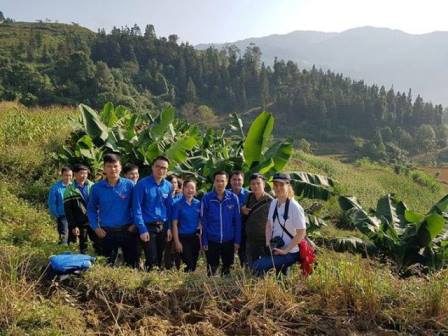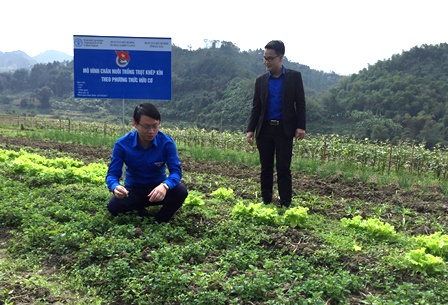Youth shape agriculture sector of tomorrow

- Visit Bananas Planting Model in Bac Kan province
FAO is working to inspire the youth of Viet Nam to become innovators and partners in the sustainable development of the country’s agriculture sector.
As the future custodians of sustainable agriculture development and food security, youth have a key role to play in Viet Nam’s future – especially with more than 40 per cent of the nation’s population employed in the sector.
To inspire young people to view the agriculture sector as a dynamic employment option, since September 2017, FAO Viet Nam launched the project “Building Coalition with Youth in Sustainable Development through Agriculture, Forestry and Fisheries” in partnership with the Ministry of Agriculture and Rural Development (MARD) and the Youth Union.
The centerpiece of the project, conducted in the northeastern province of Bac Kan where youth make up one-third of the population and 40 per cent of the predominantly agriculture-focussed labour force, was a contest for youth to showcase innovative, tech-savvy ideas to develop the agriculture sector in a sustainable manner.

- Field visit to the winner's model
In response, 22 creative entries were received encompassing cultivation, husbandry and economic development models associated with environmental protection and adaptation to climate change.
While all entries had merit, two winners received financial prizes and FAO technical support to help realize their winning ideas. Meanwhile, all contest participants benefited from participation in a FAO-run youth capacity building programme focused on developing practical skills for good practices in sustainable agriculture.
FAO also arranged several field visits for participants to learn from examples of sustainable crop production and animal husbandry models. These visits were also opportunities to exchange ideas and receive feedback from experts to further refine their entries for possible replication in the future.
“My major is not agriculture, but I have a passion for this sector. I realized that my hometown has big agricultural business potential. I have learned a lot to develop my knowledge further for starting a successful farming business,” said Dinh Tuyet Nhung, 26 years old, who took one of the top two prizes with her entry “Organic animal husbandry and cultivation of fresh herbs’’, which focused on utilizing all arming products in a closed cycle.
This closed cycle starts with cinnamon earthworms used as protein a source in home-made pig and chicken feed and worm’s vermi-compost, used as a nutrient-rich organic fertilizer for production of fresh herbs.
A balanced, home-made mixture of cinnamon earthworms, fermented bananas, cassava and corn or rice bran fed to the pigs helps to dramatically reduce farming costs, while achieving sustainable production. Pig manure is used for a small biogas plant, supplying two households with gas for cooking and electricity.
This innovative project has created a stable income for her family in Ba Be district, supplies the local market with safe and high-quality farming products and has even contributed to creating jobs for several unemployed local workers, including youth.
Through realizing the advantages of local agriculture, the high demand for safely-produced fruit and vegetables and urgent need for creating jobs for youth, the second prize winner Luong Dinh Hung encouraged his family to convert its agricultural land to follow a safe vegetable production model.
His “Linking youth in cooperatives for production of fresh off- seasonal vegetables’’ entry has since been realized with establishment of the Youth Safe Vegetable Cooperative in Na Chay village, Nhu Co commune. With FAO technical assistance and funding, the pilot 0.6 hectare crop of vegetables has been expanded to 1.2 ha and has 11 members focused on production of watermelon, tomatoes, cucumbers, bitter melon and red dragon fruit.
“We knew youth have an important role in developing the local economy. I gathered several young people into a group to carry out the pilot project. After initial success, we decided to organize ourselves into an agricultural cooperative,” said Hung.
Le Thanh Cong, the project’s coordinator from MARD, said the project had demonstrated that youth were a rich source of innovative ideas who must be engaged to help further shape Viet Nam’s agriculture sector.
“Youth participants have taken full responsibility for implementation of their respective projects. According to the initial evaluations, the two models implemented look very promising and this bodes well for the future,” said Cong.
